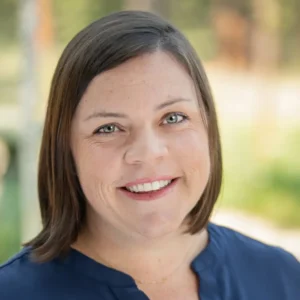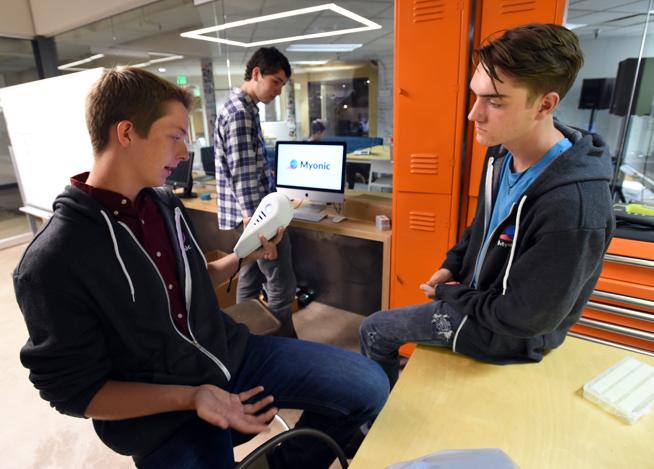How a Science Project Becomes a Company
Do you remember what you were doing at the age of 17? If you’re like most of us, your days were probably filled with going to school, completing homework, participating in sports or clubs, and hanging out with friends.
You likely even participated in a science fair or two.
The lives of four Centaurus High School students have followed a similar trajectory, but with one notable exception. With the help of Boulder-based startup accelerator Boomtown, they also have established their own tech company, Myonic.
It all began with an inspired idea of Nick Titus’s to develop a device that would allow users to move their muscles using voice commands. Through Khan Academy, Nick was able to immediately explore neurology courses and largely teach himself key concepts. Particularly beneficial for people with paralysis, Nick’s first prototype was created over a period of six months and tested on his Engineering teacher who had a brain tumor. With minimal money invested – Nick says he spent less than $100 on supplies for his initial voice-activated prototype – Nick was able to use sets of electrodes to enable the user to control his own muscles.
With that level of success under his belt, he decided to enter his device in the Boulder Valley Science Fair. Surprisingly, he won just third place. But, as Nick said, the real reward was seeing a person’s face light up when they were able to accomplish everyday tasks like picking up a bag of groceries or opening a tube of paint.
Shortly after the science fair experience, Nick realized that what he really wanted was to turn his idea into a company that could scale at a rate and at a price that would bring his device to even more people suffering from paralysis. He also realized that he’d need a little help from his friends to make the company a success. So, he brought in fellow Centaurus classmates Sam Everett as the chief financial officer, Nate Petersen as the chief technical officer and Ben Saltz as the chief innovation officer.
Their mission: To give people abilities they didn’t have before – and at a fraction of the cost of most medical devices on the market today.
As Nick says, “When you think about someone with a disability, why wouldn’t you want them to have access to something like this?”
Despite being highly driven, passionate, capable students, the Myonic team was at a loss when it came to how to start a company. Nick admits that he didn’t know what an entrepreneur was and felt that there was a distinct disconnect between what he was learning in school and what he needed to succeed in the real world. Sam adds that while he wants to be an entrepreneur, “they don’t teach for that” in a traditional school setting.
Enter the “life-changing” experience of Boomtown.
The startup accelerator doesn’t typically take on high school students, but as Boomtown Director Toby Krout points out, “They blew our minds with not only their idea, but with their openness, intellect and coach-ability. We were shocked at the maturity of their team and came up with a custom way to bring them into our program.”
By exposing Nick, Sam, and the rest of the Myonic executives to the many aspects of starting a business – from product design to intellectual property protection and accounting to manufacturing – Boomtown opened up these teenagers’ minds to the world of entrepreneurship. Through the 12-week accelerator program, which focuses on delivering the resources, curriculum, and mentorships that startups need most, the Myonic team had the opportunity to learn directly from experienced professionals as well as other entrepreneurs. As a result, the students gained valuable business skills and established significant industry connections.
Perhaps most importantly, Boomtown has allowed Nick and his team to continue to dream big. “So many people told us that it wouldn’t work,” Nick shares. “If we had listened to them, we wouldn’t be here today.”
Despite the Myonic team’s dedication to their business and to their studies, it has been challenging at times to keep up with the demands of an International Baccalaureate (IB) course load and a growing technology company. Although the school has been relatively accommodating for the students – the team took the last several weeks off school last spring to begin the Boomtown program – the reality is that Colorado’s education system is simply not designed to meet the needs of student entrepreneurs.
Nick asserts that many of his fellow high school students are just as capable of developing companies like his, but many shy away from the opportunities because they know they won’t get credit for the learning and experiences they undertake outside of school. “I wish there was a way to do both (school and entrepreneurship) better,” he says.
Case in point: All four members of the Myonic team are considering taking a “gap year” after graduating from high school this spring so that they can focus on growing their company and furthering the development of their technology. They intend to continue to operate on a shoestring budget as they refine their product and begin exploring cost-effective methods for its manufacturing. Although they sometimes feel the sting of the stigma associated with not attending a four-year college right after high school, they believe that the experiences gained from starting a company and seeing it through its next phase will be priceless.
“Successful or not, it’s such a wonderful opportunity,” says Nick.
Regardless of the ultimate fate of their company, the future is indeed bright for the talented team at Myonic. As Toby says, “The guys at Myonic are super smart, and they have a good collective heart. They’re not focused on the financial outcomes for themselves – they’re focused on the impact they can make on their particular clients. I really look forward to seeing what they accomplish in their lives.”

